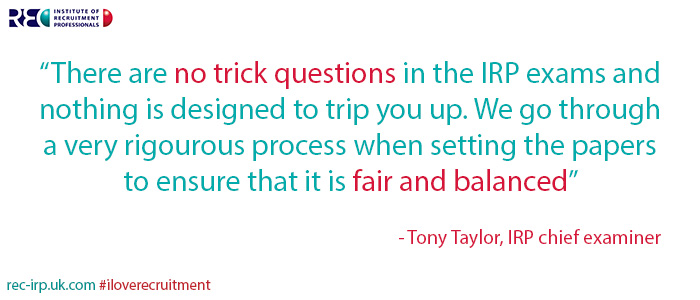Interview: Tony Taylor, Chief Examiner for the IRP
Your recruitment career

We asked our IRP chief examiner and recruitment expert, Tony Taylor, to give us the inside word on our qualifications, his top exam tips and the mistakes you can easily avoid.
Could you tell me a little more about your background?
"I’ve been involved in recruitment at many different levels and have been a study coach, examiner and subject expert with the REC for over 15 years. I have a big interest in the REC qualifications and spend a lot of time helping to develop the qualifications. I’m also proud to be an Honorary Fellow of the IRP."
Why should recruiters take one of the IRPs qualifications?
"In my experience, so many people have passed through the industry as “transient” recruitment consultants – they’ve dropped in to the industry by accident, fallen out very quickly or found it’s not right for them.
What’s pleasing now is that recruitment is genuinely a career of choice. The IRP Career Routeway lays down clear career progression for people to follow.
We’re now seeing people who are professionally qualified and who can hold their head up and say “I’m an expert in recruiting people.”
People are so important in our industry. They’re the lifeblood of any recruitment business. Having IRP qualifications enables individuals to stand out from the rest of the crowd."
What are your top tips for students studying for their IRP exams?
"Preparation. It sounds obvious, but you have really got to study the course materials. It’s always amazing when you look at the exam papers just how many seem to cherry pick the areas they like. You do have to study the whole course.
The first thing you should do when revising is to look at the syllabus. Make sure you understand it. Make use of the study coach who has been allocated to you. They’re there to help you. Give them a call. Tell them you don’t understand if something is bugging you with your coursework. Our study coaches have bags of industry experience and can make a very positive contribution to the learning process.
In the exam, we’re not looking to just test theory. We’re looking for you to apply the theory you have learnt into a practical situation. It’s vital that you understand the full syllabus and are able to apply it into real life scenarios."
What’s the biggest mistake you see students making?
"There’s a few! Firstly, I always stress the examiner’s standard mantra – “read the question carefully”. Unfortunately, people often read what they hope to see rather than what the question actually says! There are no trick questions in the IRP exams and nothing is designed to trip you up. We go through a very rigorous process when setting the papers to ensure that it is fair and balanced. Questions are carefully worded and designed to test knowledge and ability.
Sometimes it can help to break things down into smaller components, especially for scenario questions. Feel free to make notes on the question paper as that can help to jog the memory as your write your answers.
Your time management is so important. In the Level 3 Certificate examination, there are 130 marks on offer and 150 minutes available. That works out at one minute per mark, together with ten minutes on either side to prep and review your answers at the end of the examination. If you do find you’re struggling, don’t hang around on the question you’re struggling with and ignore the others. Answer as many questions as you can. It’s so frustrating when you find capable students who get carried away and don’t complete the paper. Some also make the mistake of simply writing down every single thing they know about a subject, rather than answering the question – several pages for one mark is unlikely to be a good answer! You need to zero in on the key points that the examiner is looking for and answer accordingly.
Of course, there are a lot of acronyms in the course materials so make sure you learn these and think about how they apply within your working environment. Most people can probably repeat the headings of SMART, but what really matters is how the principle applies in practice.
Gaining one of the qualifications is something you can work towards and achieve. It is something you can be really proud of. It is really great to hear about students who have gained the qualification and how it has helped them in their career and their day to day work. That is what it is all about. There are solid and impressive career opportunities within recruitment and there really is a superb array of qualifications available within the REC/IRP. They can take you right through your professional development – from Level 2 all the way up to Level 5."
Are you ready to make the move and gain one of our qualifications? Find out more on our website here.
Share this article

